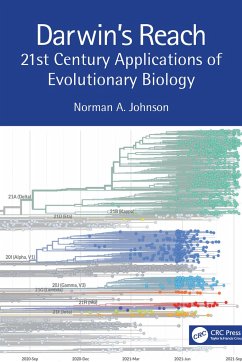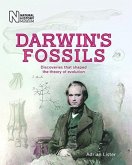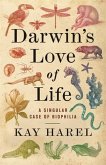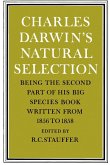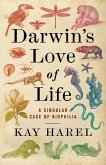- Broschiertes Buch
- Merkliste
- Auf die Merkliste
- Bewerten Bewerten
- Teilen
- Produkt teilen
- Produkterinnerung
- Produkterinnerung
Evolutionary biology is applied to a wide range of practical problems in law, medicine, agriculture, the environment, and society. Although these applications can have a dark side, rapid progress is underway or should be expected in the near future due to recent advances in DNA sequencing, new gene editing tools, and computational methods.
Andere Kunden interessierten sich auch für
![Darwin's Fossils Darwin's Fossils]() Adrian ListerDarwin's Fossils22,99 €
Adrian ListerDarwin's Fossils22,99 €![Darwin's Love of Life Darwin's Love of Life]() Karen L. HarelDarwin's Love of Life18,99 €
Karen L. HarelDarwin's Love of Life18,99 €![Ecology and Evolution of Darwin's Finches (Princeton Science Library Edition) Ecology and Evolution of Darwin's Finches (Princeton Science Library Edition)]() Peter R. GrantEcology and Evolution of Darwin's Finches (Princeton Science Library Edition)198,99 €
Peter R. GrantEcology and Evolution of Darwin's Finches (Princeton Science Library Edition)198,99 €![Charles Darwin's Natural Selection Charles Darwin's Natural Selection]() Charles DarwinCharles Darwin's Natural Selection108,99 €
Charles DarwinCharles Darwin's Natural Selection108,99 €![Darwin's Love of Life Darwin's Love of Life]() Karen L. HarelDarwin's Love of Life23,99 €
Karen L. HarelDarwin's Love of Life23,99 €![Darwin's Pharmacy Darwin's Pharmacy]() Richard M. DoyleDarwin's Pharmacy41,99 €
Richard M. DoyleDarwin's Pharmacy41,99 €![Introduction to Leadership Introduction to Leadership]() Institute of Leadership & ManagementIntroduction to Leadership61,99 €
Institute of Leadership & ManagementIntroduction to Leadership61,99 €-
-
-
Evolutionary biology is applied to a wide range of practical problems in law, medicine, agriculture, the environment, and society. Although these applications can have a dark side, rapid progress is underway or should be expected in the near future due to recent advances in DNA sequencing, new gene editing tools, and computational methods.
Hinweis: Dieser Artikel kann nur an eine deutsche Lieferadresse ausgeliefert werden.
Hinweis: Dieser Artikel kann nur an eine deutsche Lieferadresse ausgeliefert werden.
Produktdetails
- Produktdetails
- Verlag: Taylor & Francis Ltd
- Seitenzahl: 432
- Erscheinungstermin: 28. Dezember 2021
- Englisch
- Abmessung: 234mm x 156mm x 23mm
- Gewicht: 660g
- ISBN-13: 9781138587397
- ISBN-10: 1138587397
- Artikelnr.: 62573789
- Herstellerkennzeichnung
- Libri GmbH
- Europaallee 1
- 36244 Bad Hersfeld
- gpsr@libri.de
- Verlag: Taylor & Francis Ltd
- Seitenzahl: 432
- Erscheinungstermin: 28. Dezember 2021
- Englisch
- Abmessung: 234mm x 156mm x 23mm
- Gewicht: 660g
- ISBN-13: 9781138587397
- ISBN-10: 1138587397
- Artikelnr.: 62573789
- Herstellerkennzeichnung
- Libri GmbH
- Europaallee 1
- 36244 Bad Hersfeld
- gpsr@libri.de
Norman Johnson is an evolutionary geneticist, who received his B. S. from William and Mary (1987) and a Ph.D. from the University of Rochester (1992). His doctoral thesis was on the genetics of hybrid sterility between different species of Drosophila. He was a postdoctoral fellow with Michael Wade on quantitative genetics of hybrid traits between species of Tribolium flour beetles at the University of Chicago. Johnson teaches classes in genetics and/or evolution. Most of his research has been on the genetics and evolution of why hybrids between species are often sterile or inviable. Other research interests include the evolution of sex chromosomes, the evolution of extremely large dietary niches in insects, and the interplay between the relaxation of selection and the loss of traits. He wrote Darwinian Detectives: Revealing the Natural History of Genes and Genomes, published in 2007. Johnson was the lead organizer for a working group at the National Evolutionary Synthesis Center (in Durham, NC) on Communicating the Relevance of Human Evolution. One of the outcomes was a paper for American Biology Teacher that addresses the question, "if humans evolved from chimps, why are there still chimps?" Johnson was the section editor for the Applied Evolution section of the Encyclopedia of Evolution . He wrote three of the entries (overview of evolutionary medicine and cancer, pest management, and evolution and breeding) and commissioned a dozen other entries in subjects ranging from evolution and climate change response to evolutionary computation to evolution and national security.
Law. The Sequence on the stand - Uses of evolutionary genetics in court
proceedings. Kings of the Lab: Evolution and forensic entomology. Health.
Paging Doctor Darwin: An introduction to evolutionary medicine. The past
isn't through with us: evolutionary mismatch. Evolution and Infectious
Disease. Darwin vs the Emperor of Maladies: how evolutionary medicine
principles can be applied to cancer. Evolution and the stages of life. The
future is personal - personalized genomics and medicine. Food. Evolution
and breeding. Blessed Are The Cheesemakers. Pollination. Managing
agriculture. So long, and thanks for all the fish: Evolution and fish
management. Environment. Conservation Genetics. Evolutionary responses to a
rapidly changing environment. Urban ecology: Cities as the new evolutionary
frontier. Darwin Goes to the Dogs. Society. Darwinian security. Human
diversity. Our future. Epilogue - The utter strangeness of the octopus: How
evolutionary biology informs exobiology.
proceedings. Kings of the Lab: Evolution and forensic entomology. Health.
Paging Doctor Darwin: An introduction to evolutionary medicine. The past
isn't through with us: evolutionary mismatch. Evolution and Infectious
Disease. Darwin vs the Emperor of Maladies: how evolutionary medicine
principles can be applied to cancer. Evolution and the stages of life. The
future is personal - personalized genomics and medicine. Food. Evolution
and breeding. Blessed Are The Cheesemakers. Pollination. Managing
agriculture. So long, and thanks for all the fish: Evolution and fish
management. Environment. Conservation Genetics. Evolutionary responses to a
rapidly changing environment. Urban ecology: Cities as the new evolutionary
frontier. Darwin Goes to the Dogs. Society. Darwinian security. Human
diversity. Our future. Epilogue - The utter strangeness of the octopus: How
evolutionary biology informs exobiology.
Law. The Sequence on the stand - Uses of evolutionary genetics in court
proceedings. Kings of the Lab: Evolution and forensic entomology. Health.
Paging Doctor Darwin: An introduction to evolutionary medicine. The past
isn't through with us: evolutionary mismatch. Evolution and Infectious
Disease. Darwin vs the Emperor of Maladies: how evolutionary medicine
principles can be applied to cancer. Evolution and the stages of life. The
future is personal - personalized genomics and medicine. Food. Evolution
and breeding. Blessed Are The Cheesemakers. Pollination. Managing
agriculture. So long, and thanks for all the fish: Evolution and fish
management. Environment. Conservation Genetics. Evolutionary responses to a
rapidly changing environment. Urban ecology: Cities as the new evolutionary
frontier. Darwin Goes to the Dogs. Society. Darwinian security. Human
diversity. Our future. Epilogue - The utter strangeness of the octopus: How
evolutionary biology informs exobiology.
proceedings. Kings of the Lab: Evolution and forensic entomology. Health.
Paging Doctor Darwin: An introduction to evolutionary medicine. The past
isn't through with us: evolutionary mismatch. Evolution and Infectious
Disease. Darwin vs the Emperor of Maladies: how evolutionary medicine
principles can be applied to cancer. Evolution and the stages of life. The
future is personal - personalized genomics and medicine. Food. Evolution
and breeding. Blessed Are The Cheesemakers. Pollination. Managing
agriculture. So long, and thanks for all the fish: Evolution and fish
management. Environment. Conservation Genetics. Evolutionary responses to a
rapidly changing environment. Urban ecology: Cities as the new evolutionary
frontier. Darwin Goes to the Dogs. Society. Darwinian security. Human
diversity. Our future. Epilogue - The utter strangeness of the octopus: How
evolutionary biology informs exobiology.

